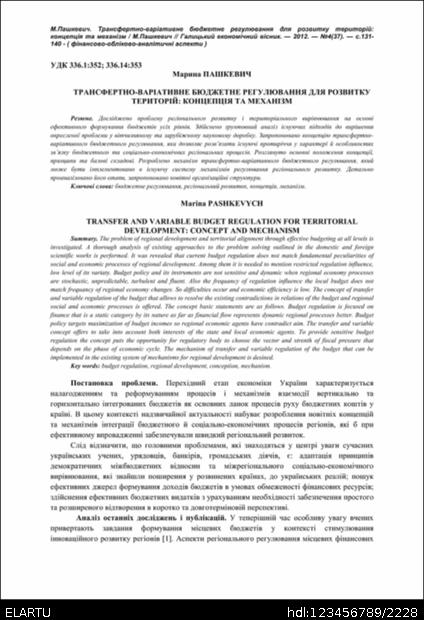Будь ласка, використовуйте цей ідентифікатор, щоб цитувати або посилатися на цей матеріал:
http://elartu.tntu.edu.ua/handle/123456789/2228

Повний запис метаданих
| Поле DC | Значення | Мова |
|---|---|---|
| dc.contributor.author | Пашкевич, Марина | - |
| dc.contributor.author | Pashkevych, Marina | - |
| dc.date.accessioned | 2013-05-27T10:36:07Z | - |
| dc.date.available | 2013-05-27T10:36:07Z | - |
| dc.date.issued | 2012 | - |
| dc.identifier.citation | М.Пашкевич. Трансфертно-варіативне бюджетне регулювання для розвитку територій: концепція та механізм / М.Пашкевич // Галицький економічний вісник. — 2012. — №4(37). — с.131-140 - ( фінансово-обліково-аналітичні аспекти ) | uk |
| dc.identifier.uri | http://elartu.tntu.edu.ua/handle/123456789/2228 | - |
| dc.description.abstract | Досліджено проблему регіонального розвитку і територіального вирівнювання на основі ефективного формування бюджетів усіх рівнів. Здійснено ґрунтовний аналіз існуючих підходів до вирішення окресленої проблеми у вітчизняному та зарубіжному науковому доробку. Запропоновано концепцію трансфертно-варіативного бюджетного регулювання, яка дозволяє розв’язати існуючі протиріччя у характері й особливостях зв’язку бюджетного та соціально-економічних регіональних процесів. Розглянуто основні положення концепції, принципи та базові складові. Розроблено механізм трансфертно-варіативного бюджетного регулювання, який може бути імплементовано в існуючу систему механізмів регулювання регіонального розвитку. Детально проаналізовано його етапи, запропоновано новітні організаційні структури. | uk |
| dc.description.abstract | The problem of regional development and territorial alignment through effective budgeting at all levels is investigated. A thorough analysis of existing approaches to the problem solving outlined in the domestic and foreign scientific works is performed. It was revealed that current budget regulation does not match fundamental peculiarities of social and economic processes of regional development. Among them it is needed to mention restricted regulation influence, low level of its variaty. Budget policy and its instruments are not sensitive and dynamic when regional economy processes are stochastic, unpredictable, turbulent and fluent. Also the frequancy of regulation influence the local budget does not match frequancy of regional economy changes. So difficulties occur and economic efficiency is low. The concept of transfer and variable regulation of the budget that allows to resolve the existing contradictions in relations of the budget and regional social and economic processes is offered. The concept basic statements are as follows. Budget regulation is focused on finance that is a static category by its nature as far as financial flow represents dynamic regional processes better. Budget policy targets maximization of budget incomes so regional economic agents have contradict aim. The transfer and variable concept offers to take into account both interests of the state and local economic agents. To provide sensitive budget regulation the concept puts the opportunity for regulatory body to choose the vector and strenth of fiscal pressure that depends on the phase of economic cycle. The mechanism of transfer and variable regulation of the budget that can be implemented in the existing system of mechanisms for regional development is desined. | uk |
| dc.language.iso | uk | uk |
| dc.publisher | Тернопільський національний технічний університет ім. Івана Пулюя | uk |
| dc.subject | бюджетне регулювання | uk |
| dc.subject | регіональний розвиток | uk |
| dc.subject | концепція | uk |
| dc.subject | механізм | uk |
| dc.subject | budget regulation | uk |
| dc.subject | regional development | uk |
| dc.subject | conception | uk |
| dc.subject | mechanism | uk |
| dc.title | Трансфертно-варіативне бюджетне регулювання для розвитку територій: концепція та механізм | uk |
| dc.title.alternative | Transfer and variable budget regulation for territorial development: concept and mechanism | uk |
| dc.type | Article | uk |
| dc.rights.holder | © „Галицький економічний вісник“ | uk |
| dc.coverage.placename | Тернопіль, Україна | uk |
| dc.status | Опубліковано раніше | uk |
| dc.subject.udc | 336.1 | uk |
| dc.subject.udc | 352 | uk |
| dc.subject.udc | 336.14 | uk |
| dc.subject.udc | 353 | uk |
| Розташовується у зібраннях: | Галицький економічний вісник, 2012, № 4 (37) | |
Файли цього матеріалу:
Усі матеріали в архіві електронних ресурсів захищені авторським правом, всі права збережені.